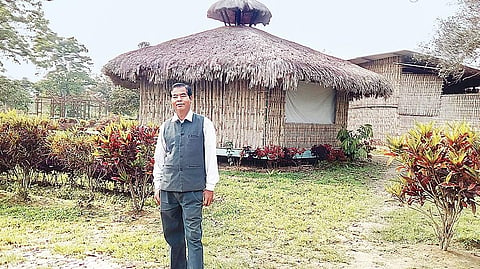

NAHARKATIYA (ASSAM): The salutes to Moni Manik Gogoi have never stopped. Only, fear has been replaced by love and respect. The man who took to the gun for the sovereignty of Assam is now a near-Gandhian — a green warrior. His popularity, owing to his green projects and philanthropy, is no less than that of any well-liked elected representative.
One of his many green initiatives is the Sasoni Merbeel project. It is a wetland and bird sanctuary near the oil township of Duliajan in eastern Assam’s Dibrugarh district. Billed as Assam’s first eco-tourism project, it is a tourist hotspot. Perched on a beel (wetland) measuring around 2000 bighas, it is home to 200 species of birds and animals such as leopards, black panthers, pythons, tortoises etc. It also has various medicinal trees. There are facilities for boating and jungle trekking as well as restaurants, parks and cottages for boarding.
“It’s a silent island. I want to turn this into a centre of pilgrimage for communal amity. We are also working towards setting up a community museum here,” Gogoi, 48, told The Sunday Standard.
The Sasoni Merbeel project, which came up in 2010, is a perfect example of conservation of the region’s fragile eco system without impacting the environment. Turning the beel into an eco-tourism project was Gogoi’s brainchild. Prior to 2010, the site was partially encroached upon by local people but Gogoi had it cleared without breaking a sweat.
“People used to fell trees and kill animals and birds. But after we developed it into an eco-tourism project, the killings have stopped,” Gogoi said. Today, over 100 local people make a living, directly or indirectly, through their involvement in the project.
Gogoi’s philanthropic work started months after he ended his association with the United Liberation Front of Assam (ULFA) in 1999. Since then, he has started a number of agricultural farms with the active participation of village youths in Tingkhong area of Dibrugarh district. With the help of the local people, Oil India Limited (OIL) and the state government, he has upgraded two government-run health centres and constructed dozens of roads, bridges, schools, community halls etc. Gradually, he grew so popular that people started seeking his help for community welfare projects. Gogoi said he could not have managed what he did without financial assistance from OIL.
A trained ULFA rebel, he was a leader in the outfit’s political wing. “During the height of insurgency in Assam in the early 1990s, my job was to drum up public support for ULFA. I travelled across Assam and also spent time in Myanmar undergoing arms training. I was arrested in 1998 when I visited my Shalmari Dighalia village in Tingkhong. After spending about six months in jail, I was released on bail. However, I didn’t go back to ULFA. Instead, I took to agricultural farming. I loved Nature from the time I was a child,” he said.
Asked if he regretted working for a banned organisation, he said, “I joined the ULFA as there was then a strong wave in its favour. It was a period when Assamese nationalism grew tremendously. Like many others, I too got attracted to it. I thought ULFA alone could change society.
“Now, when I look back, I feel my joining the outfit was not a wrong decision. I feel it is not possible to secure independence by waging an armed movement against the Government of India or its mighty military. However, I still endorse the ULFA’s philosophy about unity among communities, its theory of socialism and its fight for liberation of the Assamese for economic self-reliance.”
Gogoi does not take a single penny for the work he does for the eco-tourism project or other community services. He said he grew up in a village atmosphere and his parents always taught him honesty and brotherhood at a tender age. That he is loved and respected by the young and the old alike can be gauged from the fact that several thousand people gheraoed the police station after his arrest 1998 when he was with the ULFA. Even today, they salute him everywhere he goes. But the salutes are out of love and respect, not fear.
In 2003, OIL and the State Institute of Rural Development jointly started a project called ‘Rupantar’. Gogoi got involved as a facilitator. The idea was to form self-help groups and train them to become economically self-reliant. Thousands of families have benefitted from the initiative.
“I will keep working for the people. I have been working selflessly. Everyone (involved with the eco-tourism project) gets paid but I am not. I got job offers from OIL, several tea estates and the Assam Petrochemical Limited but I did not take them up. I want to serve humanity,” he said.
Gogoi is a recipient of the Chief Minister’s Best Community Action Award, OIL’s Young Achiever Award, Rotary Club Vocational Award and Indian Agricultural Research Institute’s Innovative Farmer Award.